Sarah Meyer, Index Research
Part I: Basra Timeline 2005
Part II: Mark Curtis, Web of Deceit and the SAS
Part III: Some Questions
Appendix : Blair Fiction Fog (posted 7/10/05)
On October 1st 1918, Lawrence of Arabia led the Arabs into Damascus in an armoured car. “Damascus salutes you, “ said a rider, flourishing his head-dress. “Multitudes of Syrians thronged the streets to celebrate liberation from the Ottoman Empire.”
More
1. Basra Timeline 2005
Buildup
There was no such welcome greeting for the armoured tanks in Basra, known as the ‘station of death' whilst the Iraqis were celebrating during the Karbala religious festival in September 2005.
There was an air of tension. Recent attacks on Westerners --
once a rare event in Basra -- had targeted British and U.S. diplomatic convoys and killed at least eight Britons and Americans.
Since the increase in attacks against UK forces two months ago, a 24-strong SAS team has been working out of Basra to provide a safety net to stop the bombers getting into the city from Iran.
In the early morning of the 19th, Fakher Haider,
an Iraqi journalist and photographer working for the NY Times, was found dead on the outskirts of Basra. Earlier, on 2 August, Steven Vincent, another journalist, was kidnapped and killed in Basra, allegedly after being taken away in a marked police car. Vincent had criticized UK security forces. More
A British official blamed Islamists. More
In an interview between Al Jazeera TV’s Anchorman Al-Habib al-Ghurayb and Fattah al-Shaykh, Al-Shaykh spoke of the background to the events of 19 September 2005: “There have been indiscriminate arrests, the most recent of which was the arrest of Shaykh Ahmad al-Farqusi and two Basra citizens on the pretext that they had carried out terrorist operations to kill US soldiers. This is a baseless claim.”
Sheikh Hassan al-Zarqani, a spokesman for Moqtada al-Sadr, said "We called a protest outside the mayor’s office on Monday (the 19th) demanding the Sheikh be released," Sheikh Hassan said. "This protest was peaceful."
Two Arrested Men
Fattah al-Shaykh continued : “the sons of Basra caught two non-Iraqis, who seem to be Britons and were in a car of the Cressida type. It was a booby-trapped car laden with ammunition 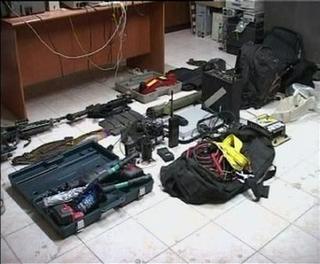 and was meant to explode in the centre of the city of Basra in the popular market. However, the sons of the city of Basra arrested them. They [the two non-Iraqis] then fired at the people there and killed some of them. The two arrested persons are now at the Intelligence Department in Basra, and they were held by the National Guard force, but the British occupation forces are still surrounding this department in an attempt to absolve them of the crime.”
and was meant to explode in the centre of the city of Basra in the popular market. However, the sons of the city of Basra arrested them. They [the two non-Iraqis] then fired at the people there and killed some of them. The two arrested persons are now at the Intelligence Department in Basra, and they were held by the National Guard force, but the British occupation forces are still surrounding this department in an attempt to absolve them of the crime.”
On the 19th of September 2005, Xinhuanet News repeated the story with some rewording, specifically that the car was “packed with explosives.”
Sheikh Hassan al-Zarqani, a spokesperson for rebel Shia cleric Moqtada al-Sadr,
explained why in another interview, two British soldiers had been arrested in Basra: ".. Events in our city took a sinister turn when the police tried to stop two men dressed as members of the Mehdi Army (al-Sadr’s militia) driving near the protest. The men opened fire on the police and passers-by. After a car chase they were arrested."
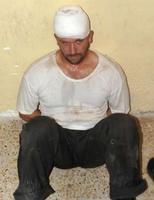 The photographs of the two men,
The photographs of the two men,
with their faces blocked out, 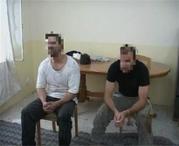
appeared on British television.
A note appeared at the bottom of the screen: 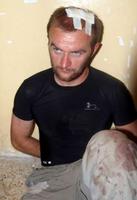 "ATTENTION EDITORS - THE BRITISH GOVERNMENT REQUESTS THAT THE IDENTIFICATION OF THIS MAN IS NOT REVEALED, EITHER VIA PIXELLATION OF THEIR FACES OR BY NOT PUBLISHING THE PHOTOS."
"ATTENTION EDITORS - THE BRITISH GOVERNMENT REQUESTS THAT THE IDENTIFICATION OF THIS MAN IS NOT REVEALED, EITHER VIA PIXELLATION OF THEIR FACES OR BY NOT PUBLISHING THE PHOTOS."
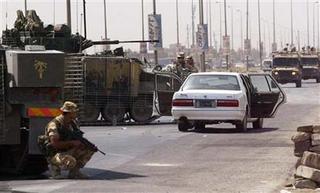 The white Toyota car, was later removed by the British. The BBC said that the gear in the car was ’standard kit’ for British special forces.’
The white Toyota car, was later removed by the British. The BBC said that the gear in the car was ’standard kit’ for British special forces.’
The men were detained at the police station for questioning by a judge.
They were carrying a a plastic-coated card, ’ the only document found on the men. The card read in English: "In an emergency, please call US and UK forces on these numbers." There were phone numbers for the cities of Amara, Nassiriya and Basra."
According to Iraqi MP Ali Dabagh, the militiamen from the outlawed Madhi Army of Muqtada al-Sadr wanted the soldiers as hostages to exchange for two of their leaders arrested on Sunday by British forces.
That afternoon the British army came in tanks and armoured cars demanding the two be released. Lee Watson,  20, said he had driven through walls and over vehicles to get to them. There were “6 SAS people” in the back of his Warrior tank. He added, “They looked like computer characters with shotguns, machine guns, pistols and knives.” However, the two British men were not in the jail. Watson continues, "The helicopter gave us directions and we followed, stormed the street, rescued the two guys and got out. They had been battered half to death but were OK. They thanked us for saving their lives and two choppers came down and away they all went." More
20, said he had driven through walls and over vehicles to get to them. There were “6 SAS people” in the back of his Warrior tank. He added, “They looked like computer characters with shotguns, machine guns, pistols and knives.” However, the two British men were not in the jail. Watson continues, "The helicopter gave us directions and we followed, stormed the street, rescued the two guys and got out. They had been battered half to death but were OK. They thanked us for saving their lives and two choppers came down and away they all went." More
A policeman, Abbas Hassan, told Reuters that a tank cannon struck a room where a policeman was praying." He was standing next to mangled cars outside the police station and jail that he said were crushed by British military vehicles. "This is terrorism. All we had was rifles."
BBC News: Video and Audio
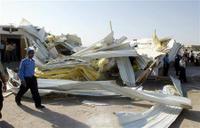 Brigadier John Lorimor, commander of the 12th Mechanized Brigade, made a full statement, in which he said that "Minor damage was caused to the prison compound wall and to the house in which our two soldiers were held." More
Brigadier John Lorimor, commander of the 12th Mechanized Brigade, made a full statement, in which he said that "Minor damage was caused to the prison compound wall and to the house in which our two soldiers were held." More
The British Defence Ministry later admitted their intentional breach.
An Iraqi television cameraman who lives across the street from the jail said about 150 Iraqi prisoners also fled as British troops stormed inside and rescued their comrades. More
Blowback
 The arrests sparked protests after British troops, backed by tanks, attempted to free the soldiers from the police station. (6 –12) other tanks, as well as helicopter gunships, were nearby. More
The arrests sparked protests after British troops, backed by tanks, attempted to free the soldiers from the police station. (6 –12) other tanks, as well as helicopter gunships, were nearby. More
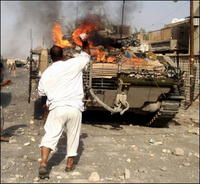 Two British armoured vehicles were attacked by a crowd, angered by the earlier arrests of two Basra citizens. Reuters television footage showed two British armoured personnel vehicles sent to the station attempting to reverse away from the crowd as it came under attack. As flames engulfed the vehicles, one soldier was seen scrambling from a top hatch, as he was pelted with stones and set on fire.
Two British armoured vehicles were attacked by a crowd, angered by the earlier arrests of two Basra citizens. Reuters television footage showed two British armoured personnel vehicles sent to the station attempting to reverse away from the crowd as it came under attack. As flames engulfed the vehicles, one soldier was seen scrambling from a top hatch, as he was pelted with stones and set on fire.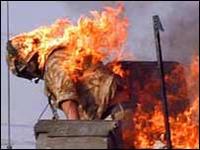
Mohammed al-Waili, the governor of Basra province, condemned the British for raiding the prison, an act he called "barbaric, savage and irresponsible"
"This is an irresponsible act," al-Waili said, adding that the British force had spirited the prisoners away to an unknown location. They were later released.
In an interview on Syrian TV, also on the 19th, Nidal Zaghbur spoke with his colleague in Baghdad, Ziyad al-Munajjid. Al-Munajjid said: “this incident gave answers to questions and suspicions that were lacking evidence about the participation of the occupation in some armed operations in Iraq. Many analysts and observers here had suspicions that the occupation was involved in some armed operations against civilians and places of worship and in the killing of scientists. “
Denouement
On Tuesday, 20 September, in a Reuters release Alaa Habib writes: “Residents of Basra, in a region with Iraq's biggest oil reserves, called on British troops to leave the country. ‘It is unappropriate for any Iraqi to be insulted by a British or an American or any other occupier, we reject the occupying forces,’ said Abbas Jassim. … "What the two Britons did was literally international terrorism … If the British had condemned this, it would have calmed the situation but instead they came and demanded them back which sets a dangerous precedent," Ali al-Yassiri, an aide to Sadr, told Reuters.
The Reuters report continues. At the Baghdad press conference, Haider al-Ebadi, an adviser to PM Ibrahim Jaafair, said, “It is a very unfortunate development that the British forces should try to release their forces the way it happened," Al-Ebadi also said that the two men “were acting very suspiciously like they were watching something and collecting information in civilian clothes in these tense times,"
In the same report, Brigadier John Lorimer, the British commander, said: "From an early stage I had good reason to believe the lives of the two soldiers were at risk," (see above, exchange of prisoners)
On Wednesday, 21 September, al Jazeera reported that about 300 Iraqis, including police officers in uniform, have demonstrated in the southern city of Basra. British forces made no attempt to control them … demonstrators carried banners calling for the return of the two British agents to face Iraqi justice. They also demanded the resignation of the provincial police chief, accusing him of being an agent of the British. "The British promised us sovereignty. So where is this sovereignty if they destroy a police station?" asked one demonstrator.
Also on 21 September, it was announced that Basra officials, following the British raid, had decided to boycott British troops. "All regular meetings between the governorate and British troops have been cancelled and we will not allow British soldiers into the governorate building or any other public office in Basra," Nadim al-Jaabari, spokesman for the provincial governor," told AFP on Thursday. More
On 21 September, alarmed by the focus on the UK SAS disaster, the Media started,
without investigation, to parrot spin about Iranian "insurgents" on the Iraq border. This "news" escalated during the following week.
On 22 September, Mohammed al-Waili told Reuters: "The governing council met yesterday and decided to stop all cooperation with the British until they meet three demands, To apologise for what happened, to guarantee that it does not happen again, and … to provide some compensation for all the damage they did during the operation," he said. The Reuters report continues: “British troops meanwhile confined themselves to their barracks in and around Basra, lowering their profile in an effort to tamp down tensions caused by Monday's raid.”
On 23 September, Adrian Blomfeld reported from Baghdad that
an Al-Sadr official said that the staged bombings were aimed at starting an ethnic war. More
On 24 September, 'Judge Ragheb Mohamad Hassan al-Muthafar told The Sunday Times in an exclusive interview that the soldiers were “suspects who attempted to commit a wilful act of murder”. According to the judge, nine people were killed and 14 injured, including two boys aged 13 and 14, when (the protestors) attacked British forces surrounding the police station where the men were detained. The Ministry of Defense is carrying out an investigation.' More
On Saturday 24 September, Reuters’ Abdel-Razzak Hameed reported that “an Iraqi judge has issued arrest warrants for two undercover soldiers of freed British soldiers.”
British military spokesman Major Steve Melbourne: replied: “We are not fully aware of the issue of these warrants…But what I must say is they have no legal basis for the issue of these." ,BBC Audio transcript, 0738
Also on the 24th, a “flurry of rockets was fired at buildings occupied by British troops.”
On 26 September, The Guardian reports that Karen McLuskie, a British diplomat in Basra, commented: “Britain refuses apology and compensation for Iraqis caught up in Basra riots.” More
29 September. British Hand Over Control of Basra More
On October 11th, Britain offers apologies and compensation for damaged buildings and personal injuries which they incurred in Basra following the arrests of the two UK soldiers.
Opinions
Elias Akleh, British Terrorism in Iraq
Ramzy Baroud, Iraq is an Occupied Nation in Revolt
William Bowles, Agents Provacateurs?
Pratap Chatterjee, Ex-SAS Men Cash In on Iraq Bonanza
Robert Fisk, When Nature and Man Conspire to Expose the Lies …
Michael Keefer: Were British Special Forces Planting Bombs in Basra?
Kurt Nimmo, Big Trouble for British Occupation of Southern Iraq
John Pilger, Sinister Events in a Cynical War
Tom Regan, The "Myth" of Iraq’s Foreign Fighters
Mike Whitney, Another Milestone in the War on Terror
Mike Whitney, Iraq: "A Right Rollicking Cock-up"
Researchers Notes
“The SAS involvement in Iraq was discovered on the 30th of January 2005 when an RAF Hercules plane crashed near Baghdad killing then British servicemen after dropping off fifty SAS members north of Baghdad to fight Iraqi guerillas.”
There is a history of occupied countries lacking any form of jurisdiction. This contradicts the ‘democratic’ principles propounded by the occupier. Human rights are systemically incurred - and ignored.
Part II : Mark Curtis, Web of Deceit and the SAS
On the day following Basra vs. The British, I opened the The Web of Deceit by Mark Curtis 1, to where I had left off, ‘Explaining the War Against Terrorism,’ which describes British undercover operations. Following is a summary of what Mark Curtis has written about the SAS, MI5 and MI6. I would like to thank Mark for allowing me to précis parts of his fine book. All quotes in the following sections are from The Web of Deceit, with one exception.
The SAS ‘Killer Squads
“An SAS officer noted: The SAS is the only agency whose job is to go out and zap people.” (p. 97)
Britain set up pseudo-terrorist ‘counter gangs’ in Palestine in the 1940s and Aden in the 1960s.” These consisted of “former terrorists and loyal tribesmen (Aden) led by British officers disguised as locals.” They were sent out in twos and threes to target those suspected of terrorism against British and local targets. (p. 96)
Aden (South Yemen): The SAS set up ‘hit squads’ whilst the RAF bombed villages and crops causing death and the evacuation of thousands. (p. 96)
Afghanistan: Former SAS officers trained Afghan mojahidins from the beginning of Soviet occupation. “Some SAS MI6 conducted ‘disruptive action’. KMS, (a private company) and then the SAS, trained commando units. Some Afghans were disguised and brought for training at a secret spot in Scotland. “Some SAS had back-up roles with the mojahidin.” (pp.62-3) 2 Britain supplied around 600 ‘Blowpipe’ … anti-aircraft missiles (later used by the Taliban) to these very same mojahidin, which shot down not only Soviet aircraft but passenger planes as well. Britain’s MI6 officers also supported and trained Afghan warlords. The CIA and MI6 trained Osama bin Laden’s supporters. The “war on terrorism” is “at least partly a creation of our (US, Saudi, Pakistan and Britain’s) making.” (p. 64)
Iran: The coup putting The Shah into power was arranged by the CIA and MI6.. (p. 310) The SAS “loaned soldiers to the Iranian military to help train the Shah’s special forces for operations against Kurdish guerillas in N. Iran.” MI6 was in contact with the Shah’s intelligence service, SAVAK; some SAVAK officers were trained in the UK in 1957. About 100,000 people were killed by the Shah’s regime. (pp. 313-4)
Northern Ireland: Modern ‘death squads’.
Kurt Nimmo has written an article about the SAS involvement in Northern Ireland. More
North Yemen: MI6 worked with tribesmen to ‘direct the planting of bombs’ at Egyptian military outposts while garrison towns were ‘shot up’ and political figures murdered.’ … MI6 “provided intelligence and logistical support to the rebels.” The rebels failed to dislodge the government. (p. 281)
Malaya: Between 1948 – 1960 a ‘counter-insurgency’ campaign against the Chinese was waged on behalf of rubber interests in the UK.
‘Killer squads’ were used in this brutal colonial war of decapitations, defoliants, detentions, villageisations’ and bombs. SAS squads from Rhodesia served alongside the British. The British declared this war an ‘emergency,’ and (as in the war in Afghanistan/Iraq) thus declared themselves immune from war crimes. (pp. 334 – 345)
Oman: Britain effectively controlled Oman, its oil, and the repressive Sultan. Britain was “therefore responsible for the repression.” (p. 277). There was a rebellion in Northern Oman, during which “the SAS fought a covert guerilla war whilst the UK Royal Air Force engaged in bombing and shelling of rebel villages and strongholds.” The “British ‘success’ was mainly due to inflicting terrifying violence.” The British ridded themselves of this Sultan and he came to live in the Dorchester Hotel.
Their next Sultan had his own personal 4-man SAS. “An SAS unit organized 1000 irregular forces to fight the rebels. Enemy corpses were
dumped in the main market square. (pp. 277 – 280)
Pakistan: SAS trained special Pakistani forces. (p. 62; see Afghanistan)
Palestine: “Squads were given a free hand to kill Jewish terrorists seeking an end to British rule and were able to adopt methods close to those adopted by the Jewish terrorists”… (p. 96)
Rhodesia: “former SAS officers were recruited… by the Central Intelligence Organisation (CIO) in the l970s.” (p. 97)
Zambia: the SAS were involved with bombings and assassinations against Rhodesian nationalists.
MI5, MI6 And Assassinations
“A long history has been buried. British government involvement in assassinating foreign leaders is virtually an elite tradition” (p. 95)
Hoxha, Albanian president, assassination plans by MI6, 1948. (p. 95)
Nasser, in the 1950’s: poisoned chocolate attempt; A SAS hit squad then considered other methods. (p. 95)
Sukarno of Indonesia: evidence of MI6 plot in 1950s. (p. 95)
Colonel Grivas, Cypriot guerilla leader: assassination plans by MI6 in late 1950s. (p. 95)
Dag Hammarskjold, 1959 plane crash: “meetings between MI5, the CIA and a South African military front company and plans to place TNT in the wheel bay of an aircraft.” described in letters. UK governmental denial of this was in a Guardian 1998 article. (p. 95)
Others considered: Chandra Bose India; The Mufti of Jerusalem (1950s) (p. 95)
Obote, Ugandan president: assassination plans by MI6 in 1969. (p. 95)
A bomb in Beirut, 1985, intended to kill Sheikh Fadlallah, the Shia leader, exploded. “Around eighty people were killed, including women and children, and over 200 wounded…The bombing was organized by the CIA and Saudi agents with the assistance of Britain’s MI6. 3 (p. 94)
Milosovic, President of Serbia: MI6 put forward three options for assassination in 1992. 1) with an SAS bomb/sniper ambush; 2) Serbian paramilitary group assassination; 3) road crash, eg. with strobe light. Later, NATO aircraft targeted him during Kosovo war. (p. 96)
The Quadafi Plot, Libya, 1996: MI6 cable revealing knowledge of assassination attempt by ‘one officer and twenty men being trained especially for this attack.’ “Claims that MI6 was in contact with ‘Osama Bin Laden’s main allies in the plot.” Quadafi was not killed; six innocent bystanders were. (p. 97) 4 MI6 paid £100,000 to the group. “Pure fantasy” said Robin Cook. Ben Bradshaw, Foreign Office Minister, later noted in 2002 that “There is no moral distinction between an attacker who kills civilians or parliamentarians and a state that wittingly provides the resources that facilitate such a terrorist attack. 5 (pp. 97-8)
British Torture & The British Army
1971 investigation: "The British found the British army had engaged in the torture of detainees … in counter-insurgency operations in Palestine, Malaya, Kenya, Cyprus, British Cameroons (1960 – 61), Brunei (1963), British Guiana (1964), Aden (1964-67), Borneo / Malaysia (1965 – 66), the Persian Gulf (1970 – 71) and in Northern Ireland (1971)." (pp. 280 – 81)
Footnotes
1. Mark Curtis, The Web of Deceit, Britain’s Real Role in the World, Vintage GB, 2003. Foreward by John Pilger. Back
2. Curtis footnote no. 30, Cooley, Unholy Wars, pp. 95-7, 81 Back
3.Curtis footnote 42, More Back
4. Curtis footnote no. 48: Dorril, MI6, p. 793; Richard Norton-Taylor, ‘Gagging orders issued in MI6 trial, Guardian, 7 October 2002 Back
5. Curtis footnote no. 50: More Back
Part III : Some Questions
Who is killing doctors in Iraq?
Who is killing journalists and photographers in Iraq?
Who is killing Iraqi teachers?
Who is killing Iraqi scientists?
Who shot Juan Torres in Bagram, Afghanistan?
Who are the "insurgents" kidnapping, beating and drugging people, forcing them to set off bombs that kill Iraqi citizens?
Who is being abducted and where are they?
What company is making the infrared bombs being used in Iraq?
Why are governments allowed to continue to commit torture and murder without fear of legal reprisal?
“State sponsored terrorism is by far the most serious category of terrorism in the world today.” (Curtis, ibid., p. 94)
Appendix : Blair Fiction fog
Spin is hypnotically interesting for journalists. The public becomes a ‘willing accomplice’ to the crime. The purpose of spin is to get the media, and thus the world, to take their eyes off the ball. In Basra, the eye was uncomfortably on the ball marked 'Two British Men Arrested.’ The most recent spin headlines in the UK media concern the alleged interference of the Iranian “insurgents” on the borders of Iraq. Bush supports this, being the original instigator of demonizing Iran.
The British SAS have been faffing around the Iranian border for two months.
The dubious Blair accusation about Iranian “insurgents” was first noticed, I believe, by Kurt Nimmo in his blog Media Shifts Attention from SAS Screw Up to Iran on the 21st of September.
Blair Fiction Fog followed the Basra officials' announcement to boycott British troops
Going yet further back, it can also be seen as a response to the Iranian steadfastness to following its nuclear power development.
This Blair-Spin is now reaching epic proportions, with denials from both Iran and Hizbollah.
The accusation is but a part of the plan to make Iran “dangerous”, in the same way as Saddam was “dangerous” with his WMDs.
When the US government feels the spin has seeded, then the (now deleted from Web) DOD nuclear plan of preemptive strike can then be activated. (Document available here)
While God speaks to Bush, we spin along our way, like lemmings, towards the cliff edge.
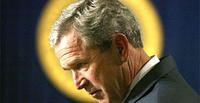 Photo Charles Dharapak/AP
Photo Charles Dharapak/AP
Is the focus by US/UK governments on Iran's 'nuclear weapons buildup' a subterfuge
for a US war on Iran to control its oil? The interference of the UK in matters Iranian continues with Iran Focus writing, on 17 October, that a person admitting to being trained by the British in Iraq was arrested for his part in the twin Ahwaz bombings.
Clearing the Fiction Fog. What information about Iran is now being hidden from the public? There is US/UK sabre rattling about "War in Iran" because of an alleged nuclear 'threat.' Any war in Iran would be for the same reason as the war in Iraq - OIL.
This article by physicist Gordon Prather on 22 October 2005 tells us what we are not being told about 'matters nuclear' in Iran.
FOOTNOTES: January 4 2006. THE US GOVERNMENT DROPS ALLEGATIONS OF IRAN INVOLVEMENT IN IRAQ.
Updates
01.04.06. Dominic Kennedy, uruknet.
Iranian militiamen were brought in by BritainDoD Contract, 11.08.06.Blackwater Security Consulting, Moyock, N.C., was awarded on Aug. 7, 2006, a $7,161,101 firm-fixed-price contract for personal security detail services - protection security services. Work will be performed in Baghdad, Iraq, and is expected to be completed by September 30, 2008. Contract funds will not expire at the end of the current fiscal year. There were an unknown number of bids solicited via the World Wide Web on March 25, 2006, and 21 bids were received. The Joint Contracting Command, Baghdad, Iraq, is the contracting activity (W91GY0-06-C-0027).
Exposing Gordon Kerr and Tony Blair’s secret army07.04.07. Simon Basketter exposes how special British units in Iraq are run by the same man who commanded death squads in Northern Ireland.
Sarah Meyer is a researcher, living in Sussex, England. She is also a “citizen reporter” for www.mediachannel.org.
email: sarahmeyer@freedom255.com

This work is licensed under a Creative Commons License.
Tags:
Basra,
Blair,
SAS,
MI5,
MI6,
Security CompaniesLabels: Basra, Blair, British terrorism, death squads, Gordon Kerr, Iraq, mark curtis, MI5, MI6, SAS
 George Bush, on a ship far from Iraq, announced “Mission Accomplished” with a grin on his face. Some of us who have witnessed war were angry.
George Bush, on a ship far from Iraq, announced “Mission Accomplished” with a grin on his face. Some of us who have witnessed war were angry.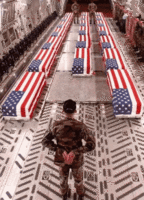
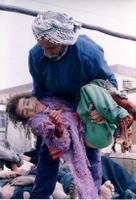 The real reason for the blanket ban on photographs of dead soldiers, dead mothers, fathers and children is that people might have sympathy for “the enemy.” There might be protest.
The real reason for the blanket ban on photographs of dead soldiers, dead mothers, fathers and children is that people might have sympathy for “the enemy.” There might be protest.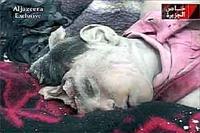 Well, I protest at this denial of reality. I protested at the time, and I continue to protest. I wrote a poem, Witness to War, when Al Jazeera was printing the faces of dead children on their front pages. The poem was printed on the website, Poets Against the War.
Well, I protest at this denial of reality. I protested at the time, and I continue to protest. I wrote a poem, Witness to War, when Al Jazeera was printing the faces of dead children on their front pages. The poem was printed on the website, Poets Against the War.
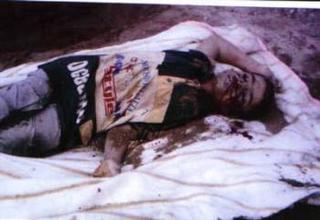

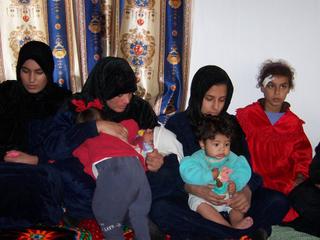












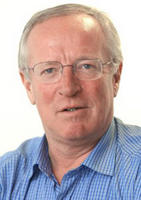
 Naomi Klein
Naomi Klein 

